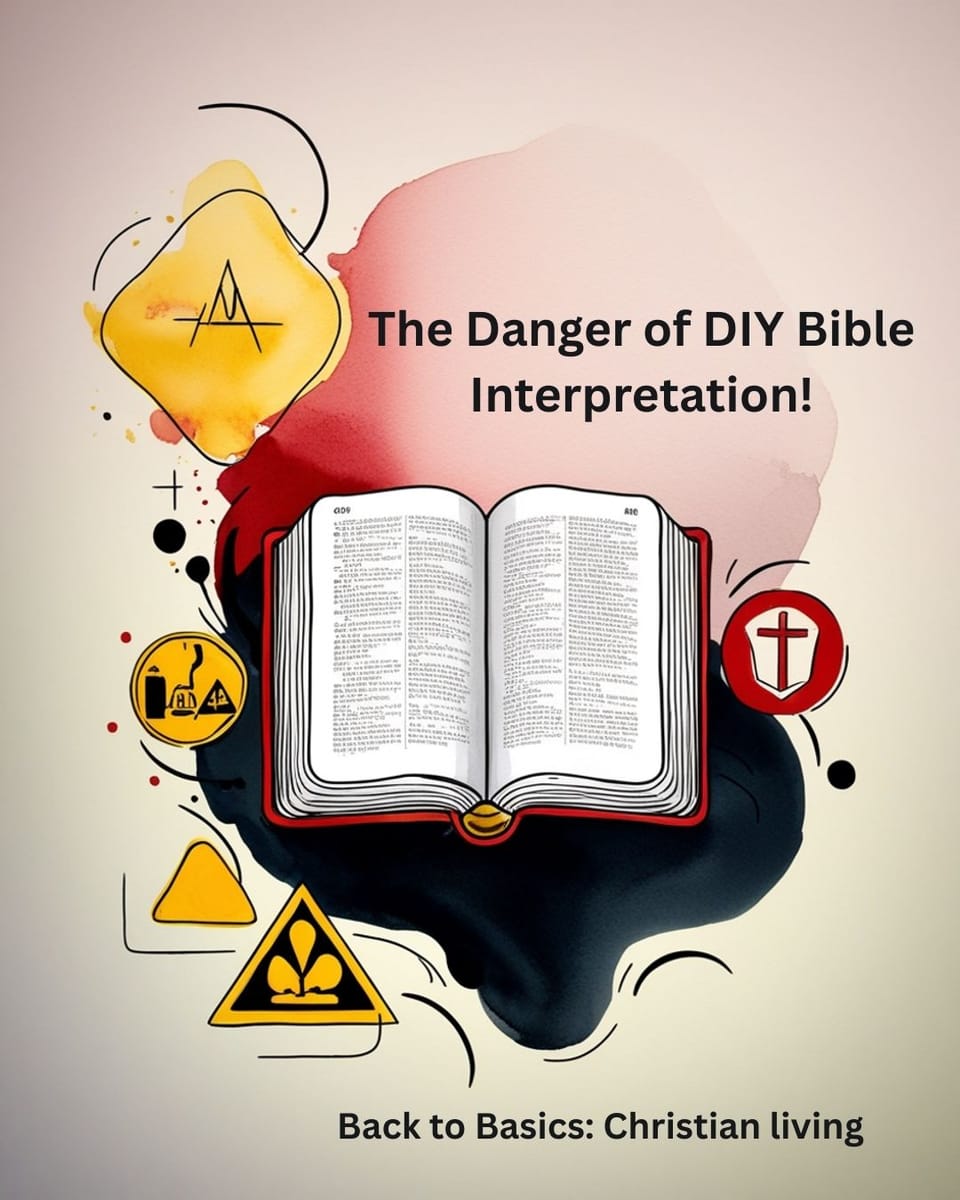The Danger of DIY Bible Interpretation!

Rightly Dividing the Word of Truth
In our modern world of individualised spirituality and "choose-your-own-adventure" approaches to faith, a concerning trend has emerged among Christians: DIY Bible interpretation. The idea that Scripture can mean whatever we want it to mean has become increasingly popular, but this approach undermines the very foundation of our faith and the authority of God's Word.
The Apostle Peter directly addressed this issue nearly two millennia ago when he warned about those who distort the Scriptures "to their own destruction" (2 Peter 3:16 KJV). This wasn't merely a pastoral concern—it was a recognition that misinterpreting God's Word carries serious spiritual consequences.
The Problem with Reader-Response Interpretation
Many Christians today approach the Bible with what scholars call a "reader-response" methodology—the text means whatever the reader feels it means. While this might sound democratic and inclusive, it fundamentally contradicts the nature of revelation itself.
Scripture is not a spiritual inkblot test where we project our own desires and biases. Rather, as Paul reminds us, "All scripture is given by inspiration of God, and is profitable for doctrine, for reproof, for correction, for instruction in righteousness" (2 Timothy 3:16 KJV). If the Bible can mean anything to anyone, then it ultimately means nothing at all.
When interpretation becomes purely subjective, several problems inevitably arise:
1. Scripture loses its corrective function
The Bible was given partly to reshape our thinking and behaviour, not to confirm what we already believe. When David prayed, "Search me, O God, and know my heart: try me, and know my thoughts: And see if there be any wicked way in me, and lead me in the way everlasting" (Psalm 139:23-24 KJV), he acknowledged that God's truth might reveal uncomfortable things about ourselves that need changing.
2. Church unity becomes impossible
Paul exhorted believers to be "endeavouring to keep the unity of the Spirit in the bond of peace" (Ephesians 4:3 KJV). When everyone develops their own "personal truth" from Scripture, genuine unity around shared beliefs becomes impossible. We end up with countless theological islands rather than a community of faith.
3. Discipleship is hindered
Jesus commissioned His followers to teach others "to observe all things whatsoever I have commanded you" (Matthew 28:20 KJV). This presupposes that Christ's teachings have an objective meaning that can be accurately passed on. Without this, discipleship becomes merely sharing opinions rather than teaching truth.
The Historical Nature of Revelation
We must remember that God chose to reveal Himself within specific historical contexts to particular people. The Bible wasn't written in a vacuum—it was written in real languages (Hebrew, Aramaic, Greek) to address real situations. The prophet Isaiah spoke to Israel during specific historical circumstances, Paul wrote to actual churches facing concrete challenges, and Jesus taught within a first-century Jewish context.
When we ignore this historical and literary context, we disconnect Scripture from its intended meaning. As Jesus demonstrated when He "expounded unto them in all the scriptures the things concerning himself" (Luke 24:27 KJV), proper interpretation involves discovering what the text actually meant, not imposing our preferred meaning upon it.
The Reformers' Vision: Clarity, Not Chaos
When the Protestant Reformers fought for ordinary believers to have direct access to Scripture, they never intended this access to become a free-for-all of contradictory interpretations. They championed the doctrine of the "perspicuity" (clarity) of Scripture—the belief that the Bible's central message is clear enough for any sincere seeker to understand.
Martin Luther warned against those who would "make the Scripture bend according to their pleasure," recognizing that subjective interpretation ultimately undermines the authority of God's Word. The Reformers understood that while not every verse is equally clear, the core message of salvation is accessible to all who approach Scripture with humility and faith.
As the Psalmist declares, "Thy word is a lamp unto my feet, and a light unto my path" (Psalm 119:105 KJV). A lamp that can point in any direction depending on who holds it provides no real guidance. For Scripture to function as our lamp, it must have a fixed and discernible meaning.
Interpretation in Community
God's Word was never meant to be interpreted in isolation. The Ethiopian eunuch, when asked if he understood what he was reading, honestly replied, "How can I, except some man should guide me?" (Acts 8:31 KJV). This humble acknowledgment led to his enlightenment and conversion.
Throughout church history, Christians have developed sound hermeneutical principles to guide interpretation. These include:
- Letting Scripture interpret Scripture
- Paying attention to literary context and genre
- Understanding historical background
- Recognizing the progressive nature of revelation
- Interpreting in accordance with the "analogy of faith"—the overall teaching of Scripture
These principles don't restrict our freedom; they liberate us to discover what God actually intended to communicate rather than imposing our own ideas onto the text.
Avoiding Both Relativism and Arrogance
While rejecting interpretive relativism, we must also avoid interpretive arrogance. None of us has perfect understanding, and we should approach Scripture with humility, open to correction and deeper insight.
The Bereans provide our model: "These were more noble than those in Thessalonica, in that they received the word with all readiness of mind, and searched the scriptures daily, whether those things were so" (Acts 17:11 KJV). They combined eagerness to learn with careful examination of Scripture.
As James advises, we should be "swift to hear, slow to speak" (James 1:19 KJV), especially when it comes to proclaiming definitive interpretations of difficult passages.
The Enduring Word
Jesus promised, "Heaven and earth shall pass away, but my words shall not pass away" (Matthew 24:35 KJV). The enduring nature of God's Word demands that we treat it not as a blank canvas for our imagination, but as the revealed truth of our Heavenly Father.
As we read Scripture, let us seek not what we want it to say, but what God intended to communicate. Let us approach the Bible with reverence, humility, and careful attention to context. And let us remember that while individual study is valuable, interpretation happens best within the community of faith, guided by the Holy Spirit who "will guide you into all truth" (John 16:13 KJV).
For if the Bible can mean anything to anyone, it ultimately means nothing at all. But when we seek its true meaning with humble hearts, it remains "quick, and powerful, and sharper than any two-edged sword, piercing even to the dividing asunder of soul and spirit, and of the joints and marrow, and is a discerner of the thoughts and intents of the heart" (Hebrews 4:12 KJV).
In an age of relativism, let us hold fast to the objective truth of God's Word, for only then does the Bible fulfil its purpose as the authoritative, life-transforming revelation of our Heavenly Father!
Key Takeaways:
- The Bible has a fixed, intended meaning that we should seek to understand, not impose our own interpretations
- Scripture interpretation requires attention to historical context, literary genre, and the overall teaching of the Bible
- Individual "DIY" interpretation undermines Scripture's corrective function, church unity, and effective discipleship
- We should interpret Scripture within the community of faith, guided by sound hermeneutical principles
- Approach Bible study with both confidence in its clarity and humility about our own understanding





